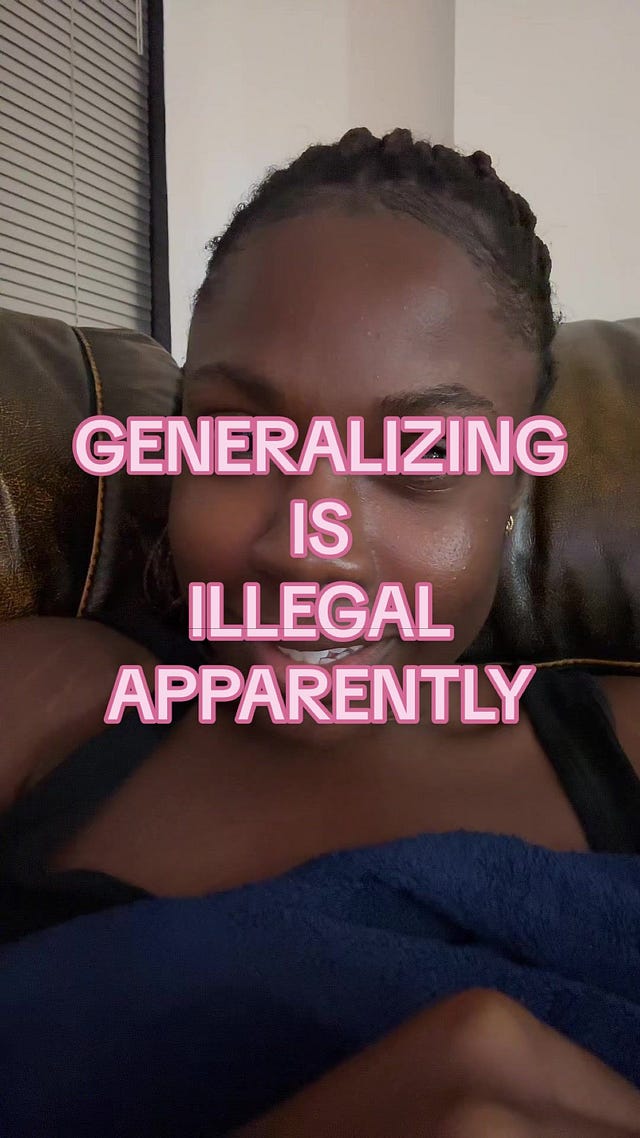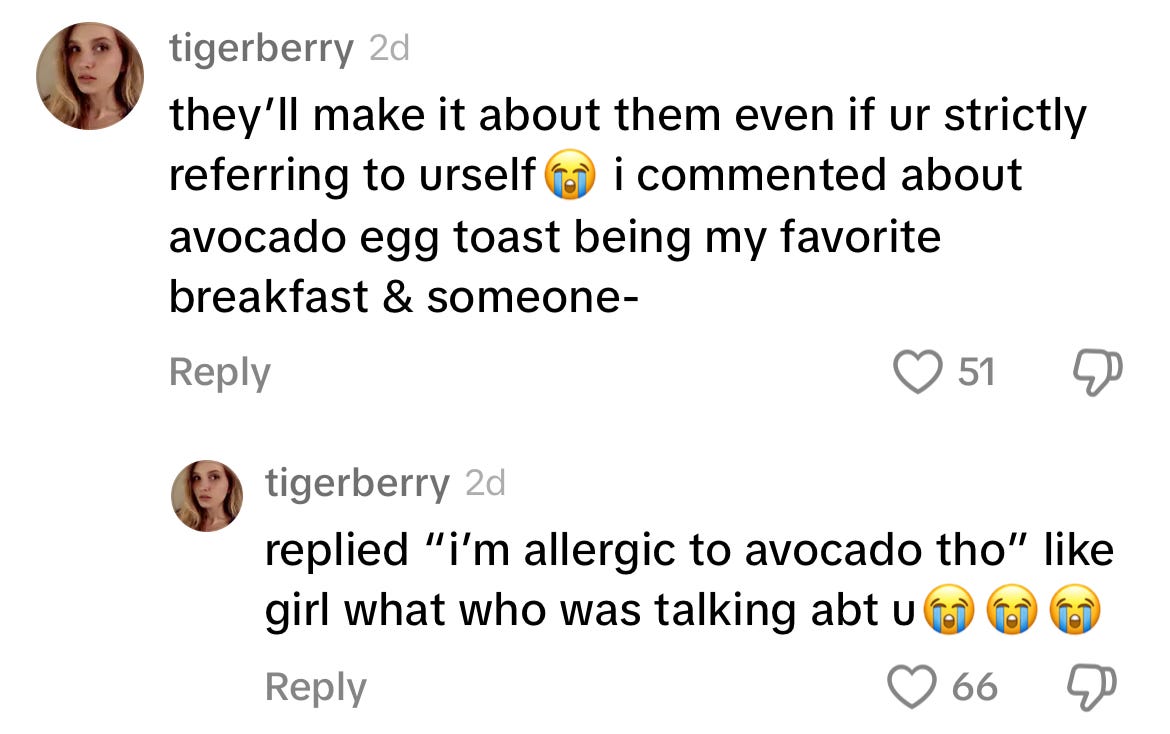‘What about me?!’
Hyper-individualism, Main Character Syndrome, and the death of nuance.
Interacting on the internet can best be summed up by the following.
A person writes a comment about how they believe apples are one of the best fruits in the world. Within minutes they’ll receive a dozen (excuse the pun) replies.
‘I disagree. I am actually allergic to apples and can’t eat them’
‘Apples are actually the most unhealthy of the fruits and the way they’re harvested makes them unsustainable and bad for the environment’
‘I don’t see you mentioning oranges? Do you hate them or something? BTW this is also banana erasure’
‘My kid has sensory issues when it comes to apples - did you think about that before you posted this?’
‘This is very triggering. My grandfather was killed by a falling apple.’
You might be familiar with the Bean Soup effect. This refers to an incident where a user posted a recipe for a bean soup and was bombarded with requests about what they should substitute the beans for if they don’t actually like beans.
Why someone who hates beans would wish to replicate a bean soup instead of absolutely any other bean-free soup, I have no idea - but it perfectly summarises the current culture of hyper-individualism that we now live in. If the content we interact with doesn’t specifically apply or relate to us, we (and by we, I mean a large proportion of other people) now feel the need to call it out.
What is hyper-individualism?
When we talk about hyper-individualism, we talk about people who are so focused on their own individual needs, ideas and circumstances that they see themselves as separate from the rest of the community.
In some ways individualism can be very positive - it recognises that all humans have unique experiences and needs. It helps people to self actualise and really know what they individually contribute to society as well as enabling people to make choices that are right for them.
On the other side of the scale, it can cause people to live in an extremely individual way that permits them to disregard or separate from the needs of others. It has links to narcissism in that those who fully subscribe to hyper-individualism (consciously or not) believe that they are more special and unique than others, and therefore should be treated with particular exception.
They see everything as revolving around them; they are the Main Character. The rest of us are merely backup artists. And if we fail to recognise this, they see it as fair game to openly feed that back to us.
Generalisations are dead
 Tiktok failed to load.
Tiktok failed to load.Enable 3rd party cookies or use another browser
This TikTok video landed in a WhatsApp chat between my friend and I this week and we quickly spiralled into a rant about all things Bean Soup. The video talks about the fact that people on the internet simply cannot see past their own perspectives and experiences but also feel compelled to apply these to every single statement, no matter how personal, sweeping or generalised it might be.
More often than not, a lot of the replies to such a statement will offer up exceptional circumstances or anecdotal evidence that apparently contradicts whatever the statement was about. From the responses on the above video, you can see that people had plenty of hilarious examples to share…
This truly is the death of the sweeping statement. No more can we be glib, facetious or speak in hyperbole without somebody smugly ‘correcting’ us and offering up some know-it-all tidbit. We cannot state a preference, pose a theory, or tell a story without other people jumping in to prove why we’re ‘wrong’.
Occasionally accusations of racism, ableism, and cultural insensitivity get thrown out with reckless abandon at the most minor of oversights.
An innocent remark like ‘walking is a great way to exercise’ gets viewed as able-bodied privilege. Any passing judgement or assumption is met with defensiveness; strangers desperately try to justify their own choices which might contradict the general statistic, the balanced think-piece, or the off-cuff joke made by another.
Now obviously, we all know that jokes and generalisations are generally littered with problems. We know that we should probe deeper into clickbait headlines and do our research. We should of course question shallow, problematic claims or false statements - and online there are many- but this is really getting out of hand.
Clearly there’s a difference between a national news outlet claiming that drag queens are corrupting children, and a meme claiming that all gay people love Jane McDonald.
Everyone is often SO keen to give their hot take that they forget it’s not always relevant or needed and incidentally end up trying to tailor the narrative back to them.
To summarise; it’s an irritating cousin of the ‘be kind’ movement - the idea that you should never be rude, angry or dismissive to another person in case they have deeper reasons for acting the way they do).
A close sibling of the ‘Not all men’ sentiment (enough said about that), and a mere hop, skip, and a jump away from Whataboutism.
I mean, who’d have thought you could still care about one humanitarian disaster WITHOUT dismissing the importance of another?
If hyper-individualism were a Christmas rom-com it would be called ‘Well, ACTUALLY…’
A non-exhaustive* and un-researched* list of why people do it
I’ve tried to pinpoint why I personally find this so annoying but also why this now seems to be so prevalent.
There is definitely a case for reading comprehension and media literacy - that these people fail to see the subtext that we’re not actually talking about THIS exception when we talk about THAT thing. Two things can be true at once - a fact we often seem to forget.
There’s also an element of self-importance and over sensitivity.
I was once witness to a conversation where someone, after a particularly fraught commute exclaimed; ‘All bus drivers are ARSEHOLES’ only for another member of the group to pipe up in a wounded tone; ‘Well, my dad is a bus driver…’.
Intellectually we know that the first person probably doesn’t REALLY think all bus drivers are arseholes. And what use is it for the second person to share this information about their dad (unless they’re going to make a really good joke about it…) because surely they can’t believe someone was intending to insult their dad specifically?
I can only assume that the latter individual wanted to make it known that they were the exception to this statement and leap to their dad’s defence out of personal discomfort. There’s also the possibility that they took some kind of enjoyment or satisfaction in making the ‘bus-driver hater’ feel bad - to position themselves as the moral party. And I must ask myself, to what cause?
I can only conclude it comes from a place of insecurity - a need to feel seen, heard, understood and excused. Thanks to social media and the moral codes of society, we are more hyper aware than ever. So when someone complains they find people who take food pictures or gym selfies annoying, we feel compelled to defend ourselves if we realise that’s something we do; we’re not like those other people who do it, we promise!
I remember feeling particularly riled up by online comments about how weddings were unnecessary and expensive when I was planning my own. I felt people were judging my morality and my character - even though none of these people had met me or knew me. I’m ashamed to say that I replied to some, determined to say my piece.
I still feel the same rage bubble up when I see generalisations about ‘women with pink hair’ and ‘child free couples’ - I feel attacked. But it’s futile really - my experience is different to theirs and to an extent, I just need to accept that. I can’t single handedly change their opinion, even if it is genuinely closed minded. At least I know it’s not true.
Part of it is also quite possibly also down to us being slaves to our algorithms. Perhaps we are so used to seeing content that’s tailored specifically to us and interacting with other like-minded people that we just can’t process it when we’re faced with something that questions our sensibilities. The problem is that NOT all content is for us and not all of it is going to be relatable.
It then becomes an issue when we interpret media as a two way street. It’s weird to message an influencer to complain about their video on renovating their garden when you personally don’t have a garden, but it happens.
I also believe it’s a result of the increasingly divisive world we live in.
writes on her newsletter about the issues with black and white thinking and the lack of nuance in online debates. By taking a stance on a topic, we tend to automatically assume that anyone who doesn’t entirely agree thinks the exact opposite. And usually we see people who think oppositely to us as ‘bad’ or being ‘against’ us in some way.This relates to the psychological concept known as ‘splitting’; a term we use to describe black-and-white, all-or-nothing thinking.
It’s how we come to the conclusion that people who love apples must hate oranges, or that people who love apples must hate anyone who doesn’t like apples. It’s how people who hate apples conflate apple eating with being pure evil. It’s common but it’s actually ridiculous.
An anxious over-explained world
 Tiktok failed to load.
Tiktok failed to load.Enable 3rd party cookies or use another browser
The unfortunate side effect of living in this wacky culture means that we now have to preface everything we say and attach disclaimers to cover and caveat the full spectrum of the human experience. We begin to over explain to negate any negative misconceptions about our words and our character, lest we fall victim to an online pile-on.
I do it myself - occasionally as a result of this blog - and STILL find myself having to lay out my point when people misinterpret what I say. Sometimes it helps, other times it falls upon ears that are simply unwilling to hear.
As I write this I have to make sure that there’s minimal risk that someone might misunderstand me and take, what are often my own personal experiences, as an attack on them, or worse, a complete disregard for any other lived experience I might not have considered. I live in constant fear that I am somehow not being mindful of the extremely niche examples for which my comments might not apply.
To do this at every turn and frankly, it’s very exhausting. Even in conversation I find myself constantly pre-apologising for not considering every single facet before I dare speak. I cannot simply trust that people will take what I say at face value, will understand when I’m being flippant, or will trust that I’m coming from a good place - even if I’m fumbling in my communication.
Which is insane really because anyone who isn’t a self-centred idiot should realise that not everyone is intending to be a jerk. And most pertinently not everything is about THEM.
It should go without saying that random Substack posts from strangers are not always speaking to your specific, exceptional and personal circumstances.
I see this kind of thinking a lot around mental health and neurodivergence in particular but it also happens a lot on the topics of parenting, social activism, and politics. Moral purism is rife and people seemingly cannot WAIT to chastise another for misspeaking or failing to mention every single eventuality.
Educating another person is fine, but this is not about education - this is about people centring themselves in discussions where they are not at the centre.
I consider myself a conscientious person who tries hard to be inclusive, understanding, and balanced in my views yet I live in a constant state of anxiety that somehow, somewhere, I am offending someone. And because I’m human, I don’t always get it right.
This is entirely because of the Bean Soup effect; because the internet is where nuance and generalisation goes to die. And so I daydream of the moment that someone poses that vague question that hints ‘what about me!?’ So I can unapologetically retort and what *about* you!??!
Have you ever experienced this for yourself? Do you have some Whataboutism to offer me on this topic?
Or perhaps you’d like to leave me your comments and let me respond to you as a human WhatAbout simulator.












I love this - "Whataboutism" fascinates me, and I think social media has made it worse. You're right in that it goes hand-in-hand with Main Character Syndrome, and people be unable to see outside of their own lives. I wonder if the pandemic is what made people so unempathetic or if it's a chronic issues with social (or both).
I think you're right about it coming from a place of insecurity, and how people dont truly believe the generalisation they are saying or reading - they choose to reply to continue the discourse, and I wonder how often people are now choosing to reply to tweets or Threads in the hope they go viral or get attention, rather than truly believing the thing they say.
Also thanks the for the mentions!!
Such a well-articulated discussion! I feel this INTENSELY.